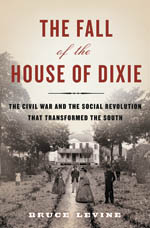
In his new book, The Fall of the House of Dixie (Random House), Bruce Levine taps the voices of everyday people to show how the Civil War transformed the South. In this excerpt, he recounts the gloom that swept the Confederacy following losses at Gettysburg and Vicksburg in mid-1863.
MARY CHESNUT ATTENDED an elite ball in the Confederate capital and there had a “long talk” with Secretary of State Judah Benjamin and Senators James L. Orr of South Carolina and R. M. T. Hunter of Virginia. Their frank, pessimistic words and mood shocked her. “These men speak out their thoughts plainly enough,” she recorded. “What they say means ‘we are rattling down the hill’” with “‘nobody to put on the brakes.’”
The chill that Chesnut felt that night in Richmond was spreading through the Confederacy. Morale in the South’s Army of the Tennessee, by then encamped in northern Georgia, plunged to new depths. Georgia governor Joseph E. Brown watched a “feeling of despondency” take hold of his state’s white population. A prominent Alabama planter thought public anxiety “unequaled since the Formation of our Government.”
The Confederacy began the war convinced that God was on its side, and since 1862 Southern soldiers had found comfort and reassurance in camp prayer meetings. But especially during the second half of 1863 the worshipful voices raised there were increasingly infused with alarm. “I went into the last battle feeling that victory must be ours—that such an army could not be foiled,” dispirited Confederate soldier Randolph McKim wrote after Gettysburg. “Now I feel that unless He sees fit to bless our arms, our valor will not avail.”
An ominous event seemed to capture those dangers and anxieties. One evening some Confederate Tennessee troops were praying near a tall hickory. Unbeknownst to them, the tree had earlier been ignited accidentally during the preparations of the campgrounds. It remained standing, but its trunk smoldered internally. As the troops conducted their service, the big tree suddenly burst into flames and collapsed, crushing 10 soldiers beneath its weight.




